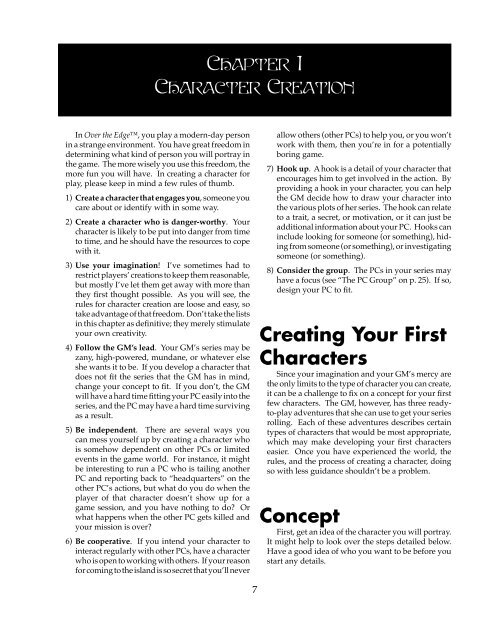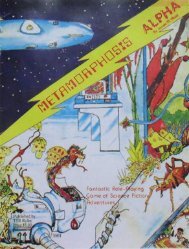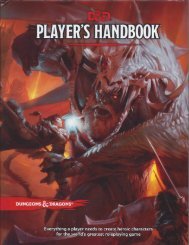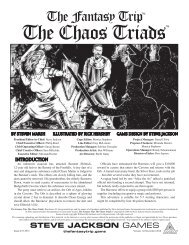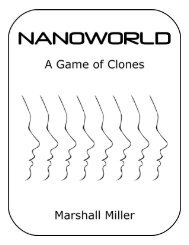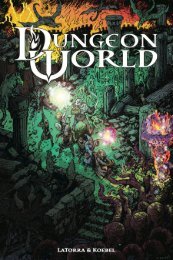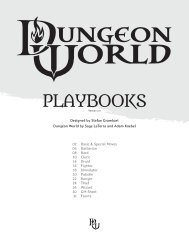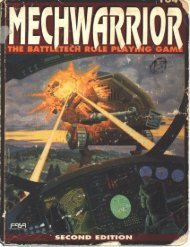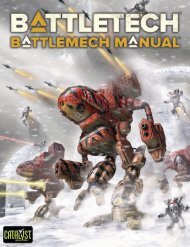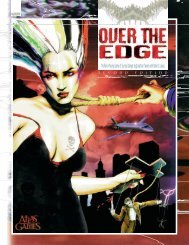Over_the_Edge_Players'_Survival_Guide
Player's guide to Over the Edge rpg
Player's guide to Over the Edge rpg
You also want an ePaper? Increase the reach of your titles
YUMPU automatically turns print PDFs into web optimized ePapers that Google loves.
Players’ <strong>Survival</strong> <strong>Guide</strong><br />
Chapter 1<br />
Character Creation<br />
CHARACTER CREATION<br />
In <strong>Over</strong> <strong>the</strong> <strong>Edge</strong>, you play a modern-day person<br />
in a strange environment. You have great freedom in<br />
determining what kind of person you will portray in<br />
<strong>the</strong> game. The more wisely you use this freedom, <strong>the</strong><br />
more fun you will have. In creating a character for<br />
play, please keep in mind a few rules of thumb.<br />
1) Create a character that engages you, someone you<br />
care about or identify with in some way.<br />
2) Create a character who is danger-worthy. Your<br />
character is likely to be put into danger from time<br />
to time, and he should have <strong>the</strong> resources to cope<br />
with it.<br />
3) Use your imagination! I’ve sometimes had to<br />
restrict players’ creations to keep <strong>the</strong>m reasonable,<br />
but mostly I’ve let <strong>the</strong>m get away with more than<br />
<strong>the</strong>y first thought possible. As you will see, <strong>the</strong><br />
rules for character creation are loose and easy, so<br />
take advantage of that freedom. Don’t take <strong>the</strong> lists<br />
in this chapter as definitive; <strong>the</strong>y merely stimulate<br />
your own creativity.<br />
4) Follow <strong>the</strong> GM’s lead. Your GM’s series may be<br />
zany, high-powered, mundane, or whatever else<br />
she wants it to be. If you develop a character that<br />
does not fit <strong>the</strong> series that <strong>the</strong> GM has in mind,<br />
change your concept to fit. If you don’t, <strong>the</strong> GM<br />
will have a hard time fitting your PC easily into <strong>the</strong><br />
series, and <strong>the</strong> PC may have a hard time surviving<br />
as a result.<br />
5) Be independent. There are several ways you<br />
can mess yourself up by creating a character who<br />
is somehow dependent on o<strong>the</strong>r PCs or limited<br />
events in <strong>the</strong> game world. For instance, it might<br />
be interesting to run a PC who is tailing ano<strong>the</strong>r<br />
PC and reporting back to “headquarters” on <strong>the</strong><br />
o<strong>the</strong>r PC’s actions, but what do you do when <strong>the</strong><br />
player of that character doesn’t show up for a<br />
game session, and you have nothing to do? Or<br />
what happens when <strong>the</strong> o<strong>the</strong>r PC gets killed and<br />
your mission is over?<br />
6) Be cooperative. If you intend your character to<br />
interact regularly with o<strong>the</strong>r PCs, have a character<br />
who is open to working with o<strong>the</strong>rs. If your reason<br />
for coming to <strong>the</strong> island is so secret that you’ll never<br />
allow o<strong>the</strong>rs (o<strong>the</strong>r PCs) to help you, or you won’t<br />
work with <strong>the</strong>m, <strong>the</strong>n you’re in for a potentially<br />
boring game.<br />
7) Hook up. A hook is a detail of your character that<br />
encourages him to get involved in <strong>the</strong> action. By<br />
providing a hook in your character, you can help<br />
<strong>the</strong> GM decide how to draw your character into<br />
<strong>the</strong> various plots of her series. The hook can relate<br />
to a trait, a secret, or motivation, or it can just be<br />
additional information about your PC. Hooks can<br />
include looking for someone (or something), hiding<br />
from someone (or something), or investigating<br />
someone (or something).<br />
8) Consider <strong>the</strong> group. The PCs in your series may<br />
have a focus (see “The PC Group” on p. 25). If so,<br />
design your PC to fit.<br />
Creating Your First<br />
Characters<br />
Since your imagination and your GM’s mercy are<br />
<strong>the</strong> only limits to <strong>the</strong> type of character you can create,<br />
it can be a challenge to fix on a concept for your first<br />
few characters. The GM, however, has three readyto-play<br />
adventures that she can use to get your series<br />
rolling. Each of <strong>the</strong>se adventures describes certain<br />
types of characters that would be most appropriate,<br />
which may make developing your first characters<br />
easier. Once you have experienced <strong>the</strong> world, <strong>the</strong><br />
rules, and <strong>the</strong> process of creating a character, doing<br />
so with less guidance shouldn’t be a problem.<br />
Concept<br />
First, get an idea of <strong>the</strong> character you will portray.<br />
It might help to look over <strong>the</strong> steps detailed below.<br />
Have a good idea of who you want to be before you<br />
start any details.<br />
7


